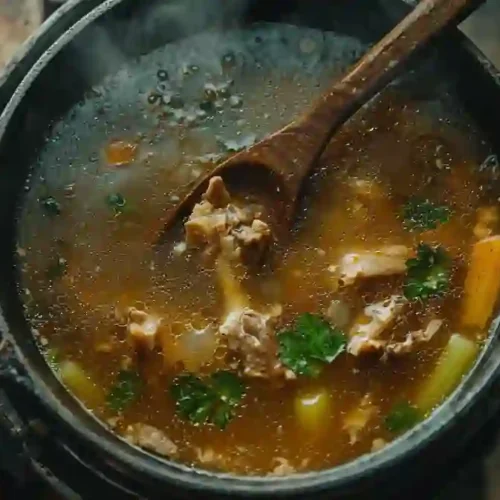
Table of Contents
I’ve discovered that soup bone benefits go far beyond rich flavor—slow-simmered bones deliver collagen, minerals, and umami depth in every spoonful, all with minimal effort. Whether you’re boosting joint health or layering savory base notes into your favorite recipes, this guide shows you how to harness those benefits step by step.
What is a Soup Bone?
A soup bone is a versatile ingredient that has been used in kitchens around the world for generations. Not only does it create rich and flavorful broths, but it also adds nutrients that are beneficial to the body. Typically, a soup bone includes the joint or marrow-filled section of a bone from beef, chicken, or other animals. When cooked slowly, the collagen and marrow inside the bones release vital nutrients, enriching soups and stews with a velvety texture.
Soup bone can be grouped into several categories:
- Beef bones: These are ideal for making hearty, robust broths due to their rich flavor.
- Chicken bones: Lightweight and versatile, these bones are perfect for quick, flavorful broths.
- Fish bones: Known for their nutrient density, they are ideal for creating light, delicate broths that cook quickly.
Furthermore, using a soup bone promotes sustainability in the kitchen. For example, incorporating bones into your cooking reduces food waste, a growing concern in modern households. Not only does this reflect a mindful approach to cooking, but it also allows you to make the most of every ingredient.
In addition, a soup bone enhances dishes across many cuisines. Whether you are creating a comforting chicken soup this ingredient ensures a satisfying result every time.
For more detailed guidance, you can explore this step-by-step guide to making bone broths. Additionally, discover creative soup ideas like this taco soup recipe to expand your repertoire.
By making the soup bone a staple in your cooking, you not only elevate your meals but also embrace a more sustainable and flavorful way of preparing food.
Types of Soup Bone
When preparing flavorful dishes, it is essential to understand that not all soup bone are the same. Each type contributes unique flavors and textures, so choosing the right one is crucial for creating a dish that stands out. By carefully selecting the best bones for your recipe, you can elevate both the taste and nutritional value of your meals.
Common Types of Soup Bone
- Beef Bone:
Beef bones are well-known for their bold, rich flavor. Because of this, they are an excellent choice for hearty broths and stews. For instance, knuckle bone and marrow-rich cuts provide a gelatinous texture that enhances recipes like French onion soup or beef consommé. To boost the flavor even further, try roasting the bones before simmering. - Chicken Bone:
Chicken bone are lightweight and incredibly versatile, making them ideal for quick broths. They work wonderfully in dishes such as chicken noodle soup or light consommés. To enhance the depth of flavor, use a mix of backbone, wings, and carcasses. - Fish Bone:
Fish bone offer a light and nutrient-rich base, making them perfect for seafood dishes. They are commonly used in bouillabaisse or fish chowder. However, it is important to ensure that the fish is fresh to avoid unpleasant flavors.
Tips for Maximizing Flavor
- Roast the bones: Roasting deepens the flavor by adding a smoky richness.
- Blanch first: Blanching removes impurities, ensuring a clear broth.
- Use aromatics: Add onions, carrots, and herbs to complement the natural taste of the bones.
How to Prepare Soup Bones for Cooking
Preparing soup bones properly is essential for unlocking their full flavor and nutritional potential. While it may seem straightforward, following a few specific steps can significantly improve the quality of your broth. Whether you are roasting or simmering, preparation makes all the difference.
Steps for Preparing Soup Bones
- Clean the Bones:
Before anything else, rinse the bones thoroughly under cold water. This step removes blood and debris, which can otherwise cloud the broth. - Blanch the Bones:
Blanching is a crucial step for achieving a clear and impurity-free broth. First, place the bones in a pot of cold water. Then, bring it to a boil and simmer for 10 minutes. Once done, drain the water and rinse the bones again. - Roast for Deeper Flavor:
Roasting the bones adds a smoky, caramelized flavor to your broth. Arrange the bones on a baking sheet and roast them in an oven at 425°F (220°C) for 20-30 minutes. Turn them halfway through to ensure even browning. - Add Aromatics:
Enhance the flavor of your broth by adding vegetables like onions, carrots, and celery. Fresh herbs, such as thyme and bay leaves, also contribute subtle depth. - Simmer Gently:
Place the bones in a pot with cold water and bring it to a slow simmer. Avoid vigorous boiling, as this can make the broth cloudy.
Step-by-Step Guide to Making a Soup Bone Broth
Making a rich and flavorful broth from soup bones is a straightforward process, but each step contributes significantly to the final result. By following this guide, you can create a broth that is both delicious and nutrient-packed.
Step-by-Step Instructions
- Gather Ingredients:
Start by collecting your soup bones and aromatics such as onions, carrots, and celery. Adding garlic, bay leaves, and peppercorns enhances the flavor even more. - Prepare the Bones:
As mentioned earlier, cleaning and blanching the bones ensures a clear broth. Roasting them in the oven at 425°F (220°C) for about 30 minutes intensifies their flavor. - Simmer the Broth:
Place the roasted bones in a large pot and cover them with cold water. Slowly bring the water to a simmer. Avoid boiling, as it can cause the broth to become cloudy. Skim any foam or impurities that rise to the surface during the first hour. - Add Aromatics and Herbs:
Once the broth is simmering steadily, add your aromatics and herbs. Vegetables like onions and carrots contribute sweetness, while herbs like thyme and bay leaves add depth. - Simmer for Hours:
Allow the broth to simmer gently for 8-12 hours. The longer it cooks, the richer the flavor becomes. For chicken or fish bone, reduce the cooking time to 4-6 hours. - Strain and Cool:
Carefully strain the broth through a fine mesh sieve or cheesecloth to remove solids. Let it cool, and skim off any solidified fat before storing.
Tips for Storage
- Store the broth in airtight containers in the refrigerator for up to a week.
- Freeze in smaller portions for long-term use.
Health Benefits of Using Soup Bones
Incorporating soup bones into your diet offers numerous health advantages. Whether you are looking to enhance your meals’ nutritional value or improve overall well-being, the benefits of a soup bone are truly impressive. These humble ingredients are packed with essential nutrients, making them a perfect addition to any wholesome diet. Additionally, bone broth made from a soup bone is an excellent source of collagen, minerals, and amino acids, all of which support overall health.
Key Health Benefits of Soup Bones
- Rich in Collagen for Joint Health:
Soup bones are an excellent source of collagen, which supports joint flexibility and helps reduce stiffness. As the bones simmer, collagen breaks down into gelatin, which can strengthen cartilage and reduce discomfort associated with joint issues. - Boosts Digestive Health:
The gelatin in bone broth also helps improve digestion by repairing the gut lining. This makes it especially beneficial for individuals with sensitive stomachs or digestive disorders. - Packed with Essential Minerals:
Soup bone release minerals like calcium, magnesium, and phosphorus into the broth. These nutrients support bone strength and overall bodily functions, ensuring that you get a natural dose of essential vitamins. - Improves Skin and Hair:
Collagen from soup bones isn’t just good for joints—it also contributes to healthy skin and shiny hair. Regularly consuming broth can improve elasticity, making skin appear firmer and more youthful. - Supports Immune Health:
Bone broth made from soup bones contains amino acids like glutamine, which strengthen the immune system. This makes it a go-to remedy for colds or when you need an extra health boost.
FAQs About Soup Bones
When it comes to using soup bones, people often have questions about preparation, storage, and benefits. To help you make the most of this versatile ingredient, we’ve compiled answers to some of the most common queries.
What are soup bone made of?
Soup bone typically come from the joints, knuckles, or marrow-rich parts of animals like beef, pork, or chicken. They contain collagen, marrow, and essential nutrients that enrich broths and stews.
How long should you boil soup bone?
For the best results, simmer soup bone gently for 8-12 hours. Shorter cooking times (4-6 hours) work for chicken or fish bone, while longer times are ideal for beef or pork to fully extract nutrients and flavor.
Can you reuse soup bone after making broth?
Yes, you can reuse soup bone, but their flavor and nutrient content diminish with each use. For a lighter broth, reuse them for a second or even third batch before discarding.
How do you store soup bone?
Fresh bones can be refrigerated for up to three days, while leftover bones should be frozen in an airtight container for up to three months. Cooked broth can be frozen in portions for convenient future use.
What is a soup bone (slang)?
In slang, “soup bone” often refers to something basic or utilitarian, much like a bone used in soup for flavor but not necessarily eaten. It can also humorously describe someone’s physical feature, such as arms or legs, likening them to the simplicity and toughness of a bone.
Are soup bones the same as bone marrow?
Soup bones typically include the bones used for making broth, which may contain bone marrow but not always. Bone marrow refers specifically to the soft, fatty tissue inside certain bones, prized for its rich flavor and nutrients. Soup bones may also include joint bones or other cuts that contribute collagen and minerals to soups and stocks.
Conclusion
In conclusion, soup bone are an essential ingredient that elevates both the flavor and nutritional value of your meals. They are versatile, cost-effective, and deeply rooted in culinary traditions worldwide. Whether you are crafting a robust broth for ramen, simmering a comforting chicken soup, or exploring global recipes like pho or oxtail stew, soup bones bring unmatched depth to your cooking.
Moreover, using soup bones aligns with sustainable cooking practices, helping to reduce food waste and support ethical choices. The health benefits of incorporating a soup bone into your diet include improved joint health, better digestion, and enhanced skin. These humble ingredients are a natural powerhouse for overall well-being. By adding soup bone to your meals, you’re not only savoring rich flavors but also nourishing your body.
To get started, follow the simple preparation steps outlined earlier, experiment with different types of soup bone, and reuse or store them for future recipes.
In the end, soup bone represent more than just an ingredient—they symbolize a mindful approach to cooking that values every part of our food. By embracing the versatility of soup bone, you can transform everyday dishes into something extraordinary while contributing to a more sustainable and healthy lifestyle.

Soup bone
Ingredients
- 2-3 pounds soup bones beef, chicken, or fish, preferably with marrow
- 1 large onion quartered
- 2 carrots cut into large pieces
- 2 celery stalks cut into large pieces
- 2 cloves garlic smashed
- 2 bay leaves
- 1 tablespoon apple cider vinegar
- 10-12 cups water enough to cover the bones
- Salt and pepper to taste
Instructions
- Optional Roasting: Preheat oven to 400°F (200°C). Place soup bones on a roasting pan and roast for 30 minutes to enhance flavor.
- Prepare Vegetables: While bones are roasting, prepare the vegetables by washing and cutting them into large chunks.
- Combine Ingredients: In a large stockpot, add roasted bones (or raw if not roasting), prepared vegetables, garlic, bay leaves, and apple cider vinegar. Pour in enough water to cover all ingredients.
- Simmer: Bring the mixture to a boil over medium-high heat. Once boiling, reduce heat to low, cover, and let it simmer gently.
- Skim Impurities: Periodically check the broth and skim off any foam or impurities that rise to the surface to ensure clarity.
- Seasoning: About an hour before finishing, season the broth with salt and pepper to taste.
- Strain: Once the simmering time is complete, remove from heat. Using a strainer or cheesecloth, strain the broth into another pot or large bowl to remove solids.
- Cool and Store: Let the broth cool to room temperature. Transfer to airtight containers and refrigerate for up to 5 days or freeze for longer storage.
Notes
- Aromatics: Feel free to add herbs like thyme, parsley, or rosemary for additional flavor.
- Acidity: The apple cider vinegar helps extract minerals from the bones, enhancing the broth’s nutritional value.
- Usage: This broth can be enjoyed on its own or used as a base for soups, stews, and sauces.
- Storage Tip: After refrigeration, a layer of fat may form on top. This can be removed and used for cooking or left to add richness to the broth.
